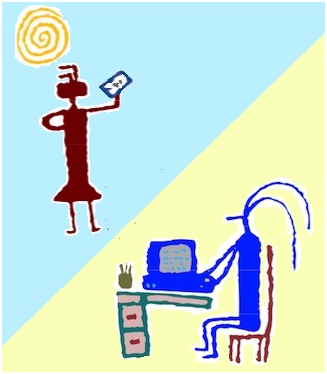It’s a mouthful, but bear with me:
The non-profit, distributed, community-oriented fediverse might be something you need to check out and use, for your personal and professional activities – and maybe the nonprofits you work for.
More and more users are leaving Facebook and Twitter to join such communities because they are uncomfortable with the corporate policies and the owners of the companies. Some nonprofits feel that they have an ethical duty to NOT be associated with such.
Most folks are staying on Facebook and Twitter, but creating profiles on other platforms, including the fediverse, just in case they decide to change their social media patronage altogether.
The fediverse is similar to social media networks like Facebook or Twitter, but it’s not controlled by any one corporation. To you, the user, it will feel like any social media channel, but how it is set up and organized in the background is very different from for-profit platforms.
The fediverse is a network of social media servers that share one another’s content. If I set up my account on one server and you set up your account on another server, we can still see and repost each other’s content because the servers are part of a “federation.” To the user, it feels just like, say, Facebook – you see all the content of those you follow – you will have no idea they are signed up via a different server than you unless you really look for it.
The only challenge you will probably ever face as a user on a fediverse is when you sign in – you have to remember the address of your server. I do this the same way I track my passwords. But, again, otherwise, a fediverse feels just like any other social network.
The most famous example of a fediverse is Mastodon, which is a lot like Twitter. When you join Mastodon, you have to join via one of its servers. Most people join via the “social” server – it’s the first one you see when you go to the site to create an account. Each Mastodon server has its own policies and administrators. If you do not like a change in policies on the server you have joined, you can leave one for another without losing followers. Most servers follow the Mastodon Covenant, which requires a basic level of administrative service as well as active moderation against various forms of hate speech. But, honestly, as a user, you probably won’t ever have to deal with ANY of this.
An added bonus: “Mastodon’s robust REST APIs are based on ActivityPub, a W3C standard”. That means Mastodon has a commitment to accessibility!
This article in InfoWorld by Andrew C. Oliver offers the best argument I’ve seen for creating a Mastodon account and for thinking very seriously about the consequences of supporting Facebook, Twitter and Instagram with your content.
As for me: I am on Mastodon and am using it more and more. I still have an account I use for professional reasons on Twitter, a Facebook professional and a personal page, and a mostly-personal Instagram account. But I like having alternatives – especially Mastodon and Reddit (and I’m getting more and more benefits from Reddit – including lots of traffic for my blog and two consulting jobs). I haven’t deleted my personal Twitter account but I use it primarily to encourage people to follow me elsewhere (difficult to do, since the Twitter algorithms now seek out such content specifically to downgrade it and keep it from being viewed by most followers).
For the nonprofits I work for, including TechSoup: I do have profiles for them on Reddit, and was able to reclaim TechSoup’s Reddit group, and posting there has resulted in some traffic here on the TechSoup community. But I still haven’t put any of them on Mastodon – mostly because I know that, in the case of one of the nonprofits I work with, none of their clients or donors are on it. But that could change… and I need to be ready.
What about you and the nonprofits you help/work for? Are they exploring other social media platforms with an eye to not over-relying solely on just one channel? Remember: no social media platform is forever. Eventually, the one you love most will go the way of AOL communities, MySpace, Friendster…
Also see:
- Don’t over-invest in one social media channel (particularly Facebook).
- Facebook, Meta, Virtual Worlds – Benefits? Risks? Does Second Life offer lessons?
- Ethical question for nonprofits: should you delete your Facebook account?
- The ethics of nonprofits staying on Twitter.
- Don’t over-invest in one social media channel: Redux (Twitter)

For detailed information about leveraging online tools to support and involve volunteers, whether they provide their service onsite at your organization, onsite elsewhere, or online, get yourself a copy of The Last Virtual Volunteering Guidebook. Online platforms and social media channels come and go, but the recommendations here are timeless. You will not find a more detailed guide anywhere on this subject than than The Last Virtual Volunteering Guidebook. It’s available both as a traditional print publication and as a digital book.

If you have benefited from any of my blogs or other parts of my web site and would like to support the time that went into researching information, developing material, preparing articles, updating pages, etc. (I receive no funding for this work), here is how you can help.

